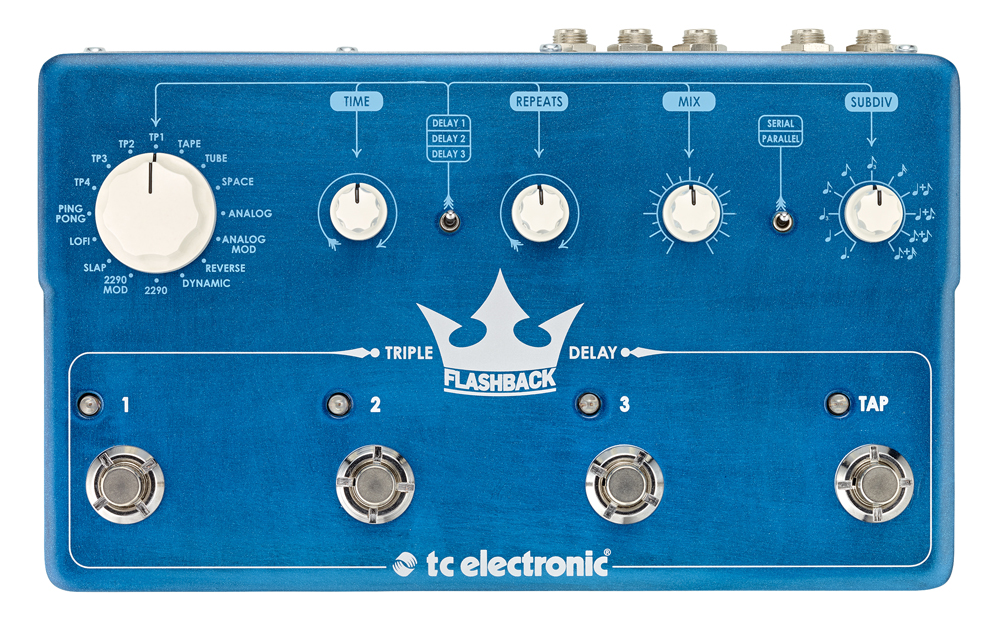Review: TC Electronic Flashback Triple Delay Pedal — Video

PLATINUM AWARD WINNER
TC Electronic has long enjoyed acclaim for its pedals and effect processors, particularly the rackmount 2290, which players still consider the gold standard for delay effects.
TC’s delays have a stellar reputation, and the company now offers eight different pedals, a number that exceeds even the amount of overdrive and distortion stomp boxes it makes.
TC’s delay pedal selection spans from the diminutive Flashback Mini to the flagship Flashback X4, but the company recently added a new top-of-the-line model to its Flashback lineup: the Flashback Triple Delay.
FEATURES As its name hints, the Flashback Triple Delay combines three independent delay units in a single pedal. When TC says “independent,” it means fully independent and not just individual time, repeat and mix settings as you’ll find on many so-called independent dual delays.
Each of the three delays has an independently selectable delay type as well, which means that any three of the 16 available delay types is available at once. For example, delay one can be a 2290 modulation effect, delay two can be tape delay, and delay three can be reverse delay. The 16 available delay types are tape, tube, space, analog, analog mod, reverse, dynamic, 2290, 2290 mod, slap, lofi, ping pong and four separate TonePrint delays that you can select and download from TC’s TonePrint website or program with TonePrint Editor software.
In addition to adjusting time, repeats and mix independently for each of the three delays, you can assign any one of 11 available rhythmic subdivisions separately for each delay. A switch lets you instantly configure the pedals in series or parallel (try doing that quickly with three delay pedals wired together), and a tap tempo switch makes it easy to manually match the master delay tempo with your band or a click track. Each delay section also features its own on/off footswitch. The rear panel has mono and stereo input and output jacks, an expression pedal jack, a mini USB jack (for downloading TonePrints via computer), and MIDI in and thru jacks for syncing delay effects with an external MIDI clock.
PERFORMANCE With a maximum delay time of seven seconds, the Flashback Triple Delay can generate a wide variety of fascinating effects and textures, from short, spacey loops to bizarre metallic modulation. It’s inspirational to experiment with vastly different delay and subdivision settings with serial processing, which can create fascinating polyrhythms and cascading note patterns. Parallel processing is helpful for dialing in ambient reverb-style effects along with long delays that retain clarity and definition you’ll never get using three separate pedals connected in series. While the pedal combines three independent delay effects, its features make it much more than the sum of its parts.
If you’re already familiar with TC’s impressive and quickly growing library of TonePrint effects created by a staggering list of name artists, you probably know that it’s the coolest thing to happen in the stomp-box world since the invention of the nine-volt alkaline battery.
Although the Flashback Triple Delay is incredibly easy to operate, players intimidated by the prospect of creating their own sounds will find a lifetime’s worth of inspiration in the effects available from the TonePrint library. It also includes TC’s beam capabilities, which allows you to download TonePrints wirelessly from a smart phone. The Flashback Triple Delay may be as easy to use as a standard stomp box, but the effects it creates rival those of a rackmount processor both in complexity and sound quality.
LIST PRICE $449.99
MANUFACTURER TC Electronic, tcelectronic.com
Three fully independent delay units, each with its own delay type, time, repeat, mix and subdivision settings.
The serial/parallel switch allows users to instantly configure the signal path for serial or parallel processing.
THE BOTTOM LINE Much more than the sum of its parts, the Flashback Triple Delay proves that three delays not only are better than one, it’s also better than three.
Get The Pick Newsletter
All the latest guitar news, interviews, lessons, reviews, deals and more, direct to your inbox!
Chris is the co-author of Eruption - Conversations with Eddie Van Halen. He is a 40-year music industry veteran who started at Boardwalk Entertainment (Joan Jett, Night Ranger) and Roland US before becoming a guitar journalist in 1991. He has interviewed more than 600 artists, written more than 1,400 product reviews and contributed to Jeff Beck’s Beck 01: Hot Rods and Rock & Roll and Eric Clapton’s Six String Stories.

